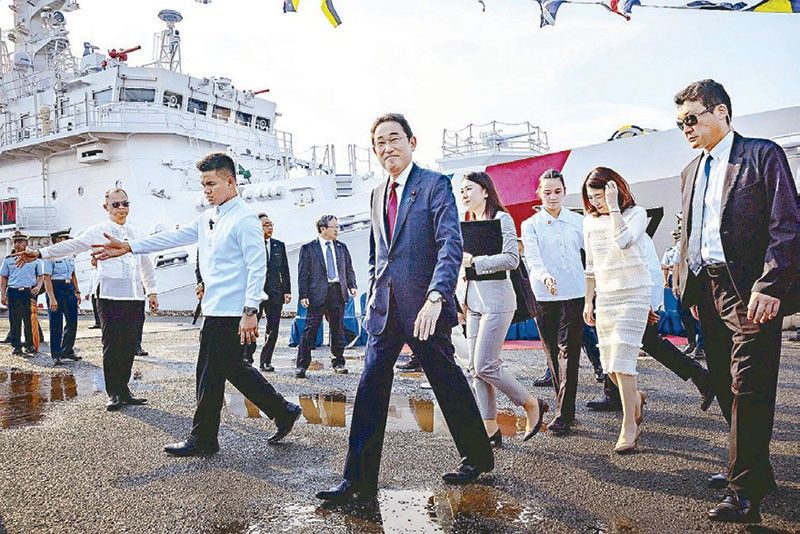‘Order in South China Sea should be governed by rules, not force’

MANILA, Philippines — Visiting Japanese Prime Minister Fumio Kishida, addressing Congress yesterday, underscored that the maritime order in the South China Sea (SCS) is “governed by laws and rules, not by force.”
In his speech before the joint session of the House of Representatives and Senate at the Batasan Complex in Quezon City, Kishida said to “maintain and strengthen a free and open international order based on the rule of law, multi-layered cooperation among allies and like-minded countries is crucial.”
“In September, President Marcos, United States Vice President (Kamala) Harris and I exchanged views for the first time and confirmed to enhance cooperation,” he noted.
Kishida, who is the first Japanese prime minister to speak before Congress, cited that in the SCS, the trilateral cooperation to protect the freedom of the sea is “underway.”
“In addition to the participation of Japan’s Self-Defense Forces in the joint US-Philippines exercises held last month, the first joint exercise by the coast guard agencies of the three countries was held in June this year,” he maintained.
“Through these efforts, let us protect the maritime order, which is governed by laws and rules, not by force,” he said.
According to Kishida, the international community is currently at a “historic turning point.”
At the same time, he pointed out, the “international order based on the rule of law that we have taken for granted is under serious threat.”
“The international community is also facing complex and interrelated challenges such as climate change and infectious diseases. Under these circumstances, we cannot afford to have the world divided based on ideologies and values,” Kishida added.
The leader has reiterated his assurance that Japan will “continue to contribute to the enhancement of the Philippines’ security capabilities, thereby contributing to regional peace and stability.”
Friendship
Kishida also said the Philippines, with the second largest population among ASEAN countries with more than 300,000 Filipinos living in Japan, is an “irreplaceable partner for Japan.”
He said more than half a century had passed since former prime minister Takeo Fukuda visited Manila in 1977.
But still, Kishida pointed out that the relationship between the two countries “is stronger than ever.”
“Japan and the Philippines have strengthened their relationship at all levels in recent years,” he added.
Strengthened Coast guard
The coast guard agencies of the Philippines and Japan would strengthen its relations to preserve peace and stability in the seas amid tensions caused by China’s claims in the South China Sea, including those covered by Philippine sovereignty.
For instance, the Philippine Coast Guard (PCG) could acquire “five or more” patrol vessels, possibly from Japan, to add to its current fleet, according to Coast Guard Commandant Admiral Ronnie Gil Gavan.
The said boats would be used for search and rescue, humanitarian assistance, disaster response and law enforcement efforts, he added.
Asked if the Philippine and Japanese coast guard agencies discussed the tensions brought about by China’s claimed ownership of the entire South China Sea, Gavan said the two agencies talked about it “in a broad sense that affect the relationship among coast guard agencies in (Southeast Asia) and in Asia.”
“We agreed to further strengthen our mutual assistance as coast guard neighbors – friends – with similar aspirations, which is peace and stability in the region,” he told reports after he toured Japan Coast Guard Commandant Admiral Shohei Ishii at the BRP Teresa Magbanua yesterday.
The PCG, led by Gavan, welcomed Ishii and Prime Minister Kishida in visiting the Teresa Magbanua, one of two 97-meter multi-role response vessels (MRRV) of the PCG with code MRRV-9701.
Procured by the Philippine government through a loan from the Japanese government, the patrol vessel – named after the Ilonggo teacher who led in fighting against Spanish, American and Japanese colonizers – was commissioned in May last year and has been deployed in the West Philippine Sea.
In his speech, Gavan acknowledged the assistance of the Japanese government in providing training programs for personnel and maritime assets.
“Japan, without question, stands as one of the most generous and steadfast partners in our journey to upgrade our capabilities. Your support is palpable, as evidence by the construction of two 97-meter MRRVs, ten 44-meter MRRVs and 10 shore-based radar,” Gavan said.
Some of the 44-meter patrol vessels from Japan have also been deployed to the West Philippine Sea, escorting boats that brought supplies for troops in the grounded BRP Sierra Madre, and facing what the PCG have repeatedly declared were acts of harassment by China Coast Guard and Chinese maritime militia. — Jose Rodel Clapano
- Latest
- Trending






























